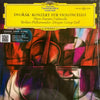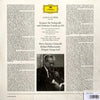



Dvořák - Konzert Für Violoncello - Pierre Fournier, George Szell, Berliner Philharmoniker
Rarity Sealed
Antonín Dvořák - Konzert Für Violoncello Und Orchester h-moll Op. 104
Cello – Pierre Fournier
Orchestra – Berliner Philharmoniker
Conductor – George Szell
1LP, standard sleeve
Original analog Master tape : YES
Heavy Press : 180g
Record color : black
Speed : 33 RPM
Size : 12'’
Stereo
Studio
Record Press : Pallas
Label : Speakers Corner
Original Label : Deutsche Grammophon
Recorded on 1 June 1961 in Berlin at Jesus Christus-Kirche, Berlin
Engineered by Günter Hermanns
Photography by Max Jacoby
Originally released in 1961
Reissued in July 1995
Tracks :
Side A :
- Satz: Allegro
Side B :
- Satz: Adagio Ma Non Troppo
- Satz: Finale (Allegro Moderato)
Reviews:
“Czech composer Antonin Dvorak (1841-1904) wrote the Cello Concerto in B minor, Op. 104 relatively late in his career, in 1895, and it has since become one of the most-popular cello concertos in the field. One can hardly discount its late-Romantic qualities, its copious melodies, and its lusty emotions.
Dvorak begins the concerto with a lengthy and stately orchestral introduction before the cello enters, an introduction that references both of the work's two main themes to come, and Szell handles things grandly. Yet when Fournier enters he fully measures up to the conductor's prodigious orchestral contributions, both soloist and orchestra playing with zest, enthusiasm, and an almost electric spark. Fournier attacks the first-movement as few others have even attempted, with no lack of virtuosity in his technique. It's a magical and exciting performance from everyone concerned, uplifting the music to heights hardly seen before or since.
Then we get the central Adagio, which should flow gently along like a slow-moving stream, wistfully, with a touch of sadness. It may have been the illness and eventual death of Dvorak's sister-in-law, with whom he had once been in love, that shared in the melancholy of this and the final segment of the concerto. Although there is never a hint of maudlin sentimentality here, there is nevertheless a sense of profound pensive yearning. It is also here that the partnership of Fournier and Szell proves most fortuitous, the voices of the cello and orchestra intertwining and interacting rapturously.
Lastly, the finale seethes with energy, ending as I say with another touch of melancholy in a climactic love duet before the work's heroic close. The Berlin Philharmonic dazzles us with its skills in the opening moments, a march that opens into a kind of peasant dance soon taken up with rhythmic spring by the soloist. Fournier and Szell again show us why they worked so well together, Fournier coaxing a lushly wistful tone from his cello and Szell matching it with a hearty yet respectful accompaniment. They close the piece in a golden glow.
(…) It's one of the best cello sounds you'll hear on record.” Classical Candor Review
Ratings :
Discogs :



